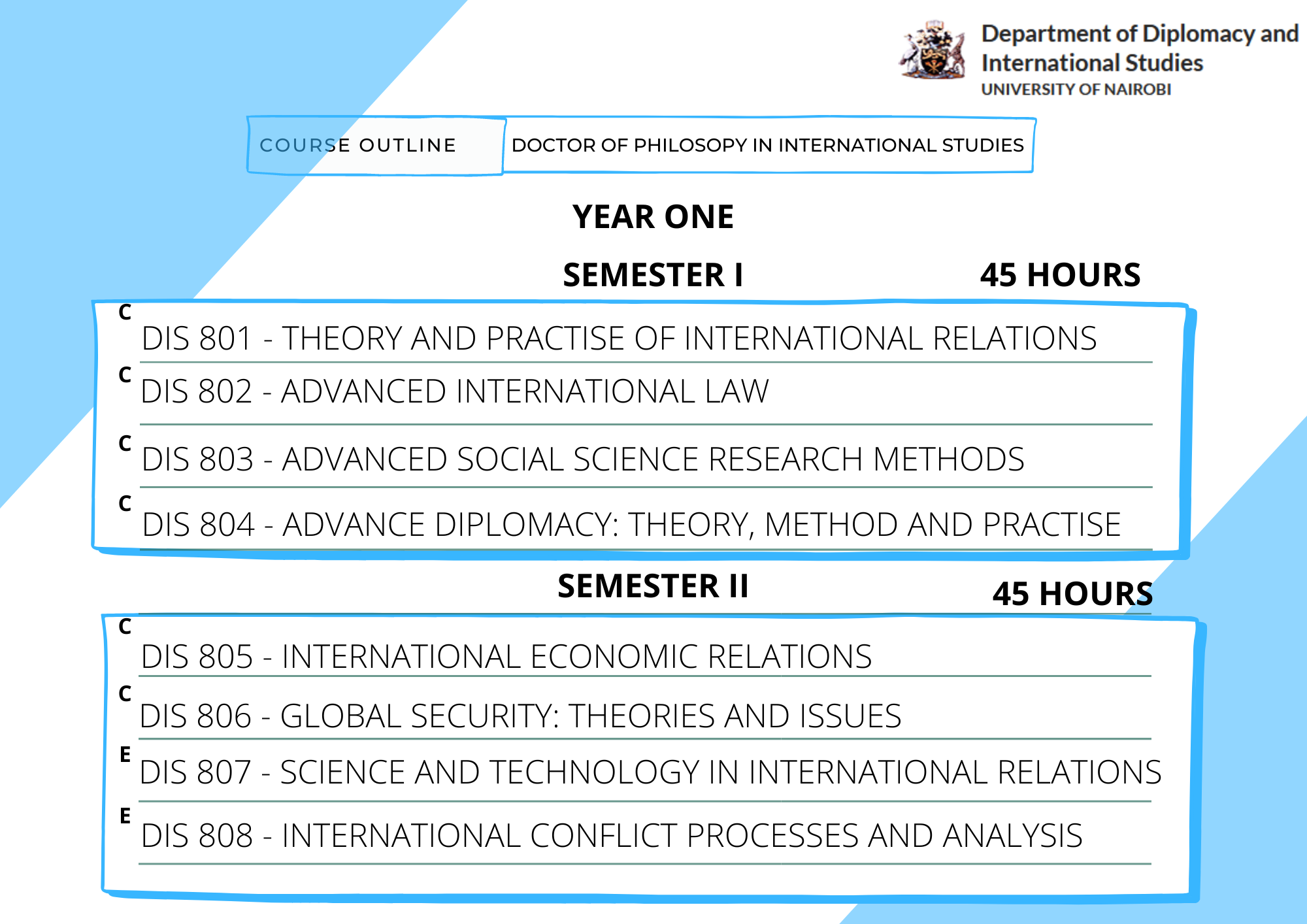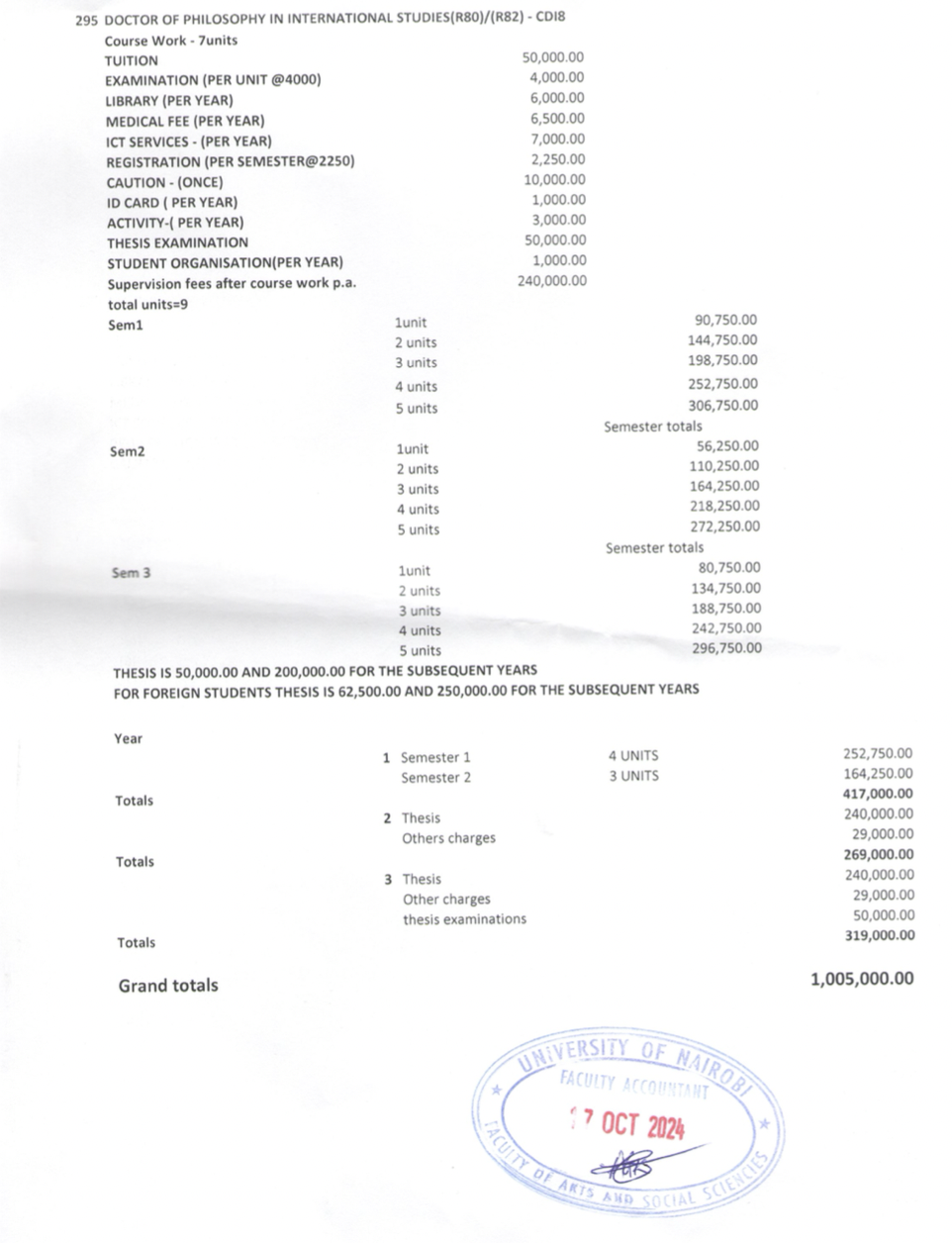Faculty of Agriculture
- Agricultural Economics
- Food Science, Nutrition & Technology
- Land Resource Management & Agricultural Technology
- Plant Science & Crop Protection

Faculty of Built Environment
- Art and Design
- Architecture
- Real Estate, Construction Management & Quantity Surveying
- Urban and Regional Planning
FACULTY OF BUSINESS & MANAGEMENT SCIENCES
- Business Administration
- Finance and Accounting
- Management Science and Project Planning
FACULTY OF EDUCATION
- Educational Management, Policy and Curriculum Studies
- Educational Communication and Pedagogical Studies
- Physical Education and Sport
- Educational Foundations
- Educational and Distance Studies
- FACULTY OF LAW
FACULTY OF ENGINEERING
- Mechanical and Manufacturing Engineering
- Civil and Construction Engineering
- Electrical and Information Engineering
- Environmental and Biosystems Engineering
- Geospatial and Space Technology.
FACULTY OF ARTS AND SOCIAL SCIENCES
- Anthropology, Gender and African Studies
- Diplomacy and International Studies
- Economics and Development Studies
- Geography, Population and Environmental Studies
- History and Archaeology
- Journalism and Mass Communication
- Library and Information Science
- Linguistics and Languages
- Philosophy and Religious Studies
- Political Science and Public Administration
- Sociology, Social Work and African Women Studies
FACULTY OF HEALTH SCIENCES
- Dental sciences
- Nursing Sciences
- Public and Global Health
- Human Anatomy & Physiology
- Clinical Medicine & Therapeutics
- Paediatrics and Child Health
- Obstetrics & Gynecology
- Human Pathology
- Diagnostic Imaging & Radiation Medicine
- Medical Microbiology and Immunology
- Ophthalmology
FACULTY OF SCIENCE & TECHNOLOGY
- Computing and Informatics
- Mathematics
- Earth & Climate Science
- Biochemistry
FACULTY OF VETERINARY MEDICINE
- Public Health,Pharmacology & Toxicology
- Veterinary Anatomy & Physiology
- Animal Production
- Clinical Studies
- Veterinary Pathology, Microbiology & Parasitology

RESEARCH INSTITUTES
- Wangari Maathai Institute for Peace and Environmental Studies
- Institute of Nuclear Science & Technology
- The Institute for Climate Change and Adaptation
- Kenya Aids Vaccine Institute
- Institute of Diplomacy and International Studies
- Institute of Anthropology, Gender and African Studies
- Institute of Tropical & Infectious Diseases
- East African Kidney Institute
- Population Studies and Research Institute
- Institute for Development Studies
- Confucius institute
RESEARCH CENTRES
- African Women's Studies Centre
- Center for Epidemiological Modelling and Analysis (CEMA)
- Centre For Biotechnology & Bioinformatics
- Centre for Advanced Studies in Environmental Law & Policy
- Centre for Translation and Interpretation
- Virtual Tour
- Data Privacy

Regional Scholarship and Innovation Fund Supports 11PhD Students
The University of Nairobi is one among seven of the African Host Universities in the area of ‘Energy including renewables’ and has been allocated 11 PhDs students in 2019/2020 to pursue PhD in physics beginning May 2019/2020.
- Read more about Regional Scholarship and Innovation Fund Supports 11PhD Students
Research Resources
- University Library
- Research, Innovation and Enterprise
- UoN Digital Repository
- Search for UON Publications
- Intellectual Property
- UON Academic Journals
- Kenyatta National Hospital and University Of Nairobi Ethics and Research Review Committee
- UoN Suppliers Portal
Student Resources
- Faculty ICT Support Emails
- Academics Division Website
- Online Application for self sponsored Applicants
- Student Portal
- E-Learning Portal
- Mtihani Portal
- Library Services Portal
- Transcript/Certificate Application
- Employer's Graduates verification

Staff Resources
- Staff Email
- UoN WIFI Page
- UoN Intranet
- Search Staff
- Online Leave Application
- Chuna Sacco
- Academic Staff
- Administrative Staff
- Chuna Sacco
- Uon Intranet
- Achievements
- Achievers Awards
- Guests & Alumni
- Historical Projects
- Staff Convocation

To produce qualified and morally upright diplomacy and international studies professionals, who have competence in relevant skills for effective service to both the Kenyan and international society, with decorum and prowess.
To ensure a comprehensive scope and in-depth analysis of global challenges the program is designed to include diverse issues including globalization and emerging trends in the social, economic, political, environmental and technological realms of international interaction, with a view to producing highly knowledgeable international Studies scholars; technocrats and policymakers.
Course Objectives
- To provide students with extensive academic skills and knowledge in their areas of specialization.
- To aid students in the development of ideas and solutions to problems that may arise in their fields of specialization over time.
Mode of Delivery
The PhD Programme is offered using two modes of delivery namely:
1. Face to Face
The methods of instruction shall be interactive and shall consist of lectures, class presentations, seminars, tutorials, case studies, fieldwork, practical sessions, student-teacher consultations, supervised independent study, group projects, guest speakers, or any combination of these.
2. Open, Distance and E-Learning (ODeL)
The Open, Distance and e-Learning Programme will run for a minimum period of seven (7) semesters and maximum of fifteen (15) semesters of fifteen (15) weeks each under the following guidelines;
i. This programme will also be offered off-campus using multi-media approaches in distance education
ii. The main media of instruction will be e-learning materials which will be provided on the online LMS for synchronous learning and will also be made available in external storage devices as back-up for asynchronous learning.
iii. The content will be uploaded on the e-learning platform after conversion into e-format to provide collaborative learning through student-student, student-instructor and evaluation interaction.
iv. The materials will be accessed through a robust Learner Management System (LMS) and other e-learning Applications (Apps) downloadable on various electronic devices.
v. There will be limited face-to-face tuition during residential sessions
vi. Learner support services including academic and technical support shall be provided using multi-media approaches and during the limited face-to-face sessions.

Candidates for the Doctor of Philosophy(PhD.) degree in International Studies must be:
- Holders of a master’s degree from the University of Nairobi or its equivalent from another university recognized by the University of Nairobi Senate, with specialization in one or more of the following fields: Diplomacy, International Relations, International Law, International Economics and International Politics.
Intake is done in September only.
APPLICATION INFORMATION
To apply for the course you are interested in visit this link below for more information.
https://application.uonbi.ac.ke/
CONTACT SUPPORT PERSON
Dr. Maluki -chair DDIS Email. [email protected]
CAREER OPPORTUNITIES
Studying International Studies at the Department of Diplomacy and International Studies will prepare students for careers in various fields that include:
- Foreign service
- Diplomatic missions
- International Organizations e.g. United Nations, African Union, East African Community, World Bank, etc.
- International Non-Governmental Organizations e.g. Human rights Watch, Amnesty International
- Government Security agencies
- International Humanitarian agencies e.g. International committee of the Red Cross.
- Educational Institutions: University teach and research
- Private sector: International Business.
INTERNSHIP OPPORTUNITIES:
Apart from using the university career office, our experienced academics staff will advise and guide our students on how to expose themselves by developing applicable skills and once the student identifies an internship opportunity, the Chair DDIS will provide a recommendation letter.

Written Examinations The common regulations for written examinations for the University of Nairobi shall apply. 1. Candidates shall have their coursework examined at the end of the semester in which the courses have been taken. 2. The assessment for each course unit shall consist of:
a) A 3-hour end of semester written examination that shall constitute 70% of the total marks. b) Continuous coursework assessment based on assignments, term papers and seminars that shall constitute 30% of the total marks.
3. A candidate who fails in up to one-third of the course units in an academic year shall be allowed to take supplementary examination(s) in the course unit(s) failed.
4. A pass obtained in the supplementary examination will be recorded as 50%.
5. A candidate who fails a supplementary examination shall be allowed to repeat the failed supplementary examination once.
6. A candidate who fails in more than one-third of the course units in an academic year or fails a supplementary examination at the second attempt or fails to complete the programme within the stipulated period shall, on the recommendation of the DDIS Board of Examiners and approval by the University of Nairobi Senate, be discontinued.
7. In case of an exam irregularity by any student, the CUE regulations on what constitutes an exam irregularity and the corresponding disciplinary action shall apply.
Moderation of examinations End of semester exams are drafted by the course lecturers after which they will be submitted to the external examiner for moderation.
Thesis Regulations 1. A student must pass all course units before presenting a research proposal for approval in a faculty postgraduate committee.
2. The Chair shall forward the corrected proposal, certificate of correction, Plagiarism certificate, declaration form and where necessary ethical certificate with the Faculty Board minutes to the Graduate School requesting for full registration of the student.
3. After approval of the research proposal, the student will undertake supervised research, write and submit a thesis within the remaining period of the program. In the course of the research work, the student shall be expected to present a minimum of two seminars and publish at least two articles in a peer reviewed journal.
Thesis Examination 1. The common regulations for submission and examination of PhD thesis of the University of Nairobi shall apply.
2. The Chair of the Department shall nominate members of the thesis Board of Examiners and recommend to Graduate School for appointment in respect to each candidate defending a PhD thesis.
3. The External Examiner and Internal Examiners shall each be required to submit to the Graduate School an independent written assessment of the thesis. 4. Upon receipt of the examiners' reports, the Graduate School in consultation with the Chair of the Department shall convene a meeting of the Board of Examiners for the candidate's oral examination.
Graduation Requirements A student who will have successfully completed and passed all written exams and passed in both written and oral defence of the thesis will qualify to graduate with a PhD in International Studies.
Course Evaluation The course will be evaluated through external examiners’ reports which are expected to pint out strengths and shortcomings of the program and the way it is taught and examined. In any case the PhD Curriculum will be reviewed after every five years inconformity with the University of Nairobi regulations.
© University of Nairobi 2024. All rights Reserved.

IMAGES